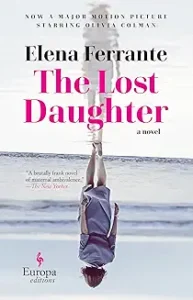The Lost Daughter by Elena Ferrante 2006
Written five years before ‘My Brilliant Friend’ and like her more famous Neopolitan Quartet, the basis for a popular movie, Ferrante’s book was another one of those ‘Great Short Books’ featured in the Kenneth Davis book, “Great Short Books”.
This is a very creepy book that had me edgy and tense from the opening pages until the final sentence. Leda, a 48 year old, divorced, Naples-born professor of English literature living in Florence, returns to the southern Italy for a several week, quiet beach vacation to relax and recover her creative juices stifled by her teaching and her now adult daughters. Seeking space and quiet, she instead finds herself in the middle of drama when the beach she visits becomes the scene of a large, Neopolitan family’s noisy and fractious struggles. The focus of Leda’s attention among this large cast of characters is Nina, a beautiful young mother of Elena whose doll becomes the central feature of the novella’s plot.
Leda is the mother of two daughters, Bianca and Marta, whom she had abandoned for three years when they were young because she was being smothered by motherhood, marriage, and family. Living on her own with the freedom she had sought but also with the pain of having abandoned her children, she ultimately returned, divorced, but remained tightly connected with her girls, a source of both pleasure and tension. All of this gets twistedly translated into her projections onto Nina and her young daughter, and one day at the beach, it all becomes explosively focused on one action which I will not share because it would spoil your reading of the book.
Ferrante writes with power, passion, and beauty (‘crystalline, directness, clarity”) so it is easy to see why her Brilliant Friend series has become such a popular best seller. This book distills the themes of those four volumes into one laser-like, powerful short novella. Its cinematic setting and action were turned into an eponymous movie in 2021 which received three Academy Award nominations. James Wood is quoted by Davis in his review of this book as follows: “More than these occasional and fairly trivial overlappings with life, the material that the early novels visit and revisit is intimate and often shockingly candid: child abuse, divorce, motherhood, wanting and not wanting children, the tedium of sex, the repulsions of the body, the narrator’s desperate struggle to retain a cohesive identity within a traditional marriage and amid the burdens of child rearing.”
This is a powerful and unsettling book which at 140 pages can be read at one sitting if one has the time and the stomach to stick with it. I doubt if I’ll move on to the Neopolitan Quartet, but I’m glad I made Ferrante’s acquaintance, whoever she turns out to be.



